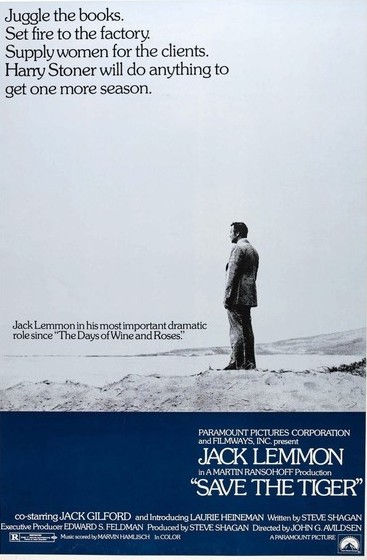Cinema Revisited: Save The Tiger (1973)
- Nov 4, 2019
- 3 min read
Directed by John Avildsen. Starring Jack Lemmon, Jack Gilford, Laurie Heineman, Thayer David, Patricia Smith. Released February 14, 1973. Running time: 100 minutes.

Jack Lemmon had a long career of outstanding screen performances from snappy comedy to serious drama. Classics like "Some Like it Hot (1959)," "The Odd Couple (1968)," "The Apartment (1960)," Days of Wine and Roses (1961)," etc, are better because he was cast to appear in them. Lemmon won his only Best Actor Oscar for his work in "Save the Tiger" (he had won Best Supporting Actor for "Mister Roberts" in 1955). It could be argued that his performance in "Save the Tiger" is the finest of his career.
Lemmon plays Harry Stoner, a disillusioned middle-aged businessman who once proudly served in World War Two and is now unable to comprehend what American society and culture has become. His business has faltered, he owes a lot of money, and he must decide whether or not to eschew his morals and burn down his warehouse for the insurance payment. Life's tensions have become so great he often screams in his sleep. While his wife is out of town for a family funeral, Harry spends a couple of days where he steps away from his life and explores what the edgier aspects of the culture has to offer.
Harry Stoner is a complex character and Lemmon effectively explores every complexity. At once he is blissfully listening to big band music and reminiscing about favorite baseball stars from an era that has long since passed. Then again, at his business, he is setting up sexual dalliances for out of town clients. He has clandestine meetings in a poorly attended porn movie theater with underworld figures to arrange the burning of the warehouse, and then as he leaves, he donates to an animal rights cause on the street.
Perhaps the most fascinating scene is when he picks up a hitchhiking hippie girl and engages in a one-nighter with her. In an effort to connect with this woman half his age, he engages her in a game where each names a person of their own era. The girl struggles with this concept, naming the immediately popular, while Stoner ecstatically comes up with a variety of names from movies, music, sports, and politics of the 1930s and 1940s, each name seemingly conjuring a separate memory for him. With each new name, Harry becomes more emotional, more manic, to the point where he becomes frightening to the girl. It is one of the most powerful screen moments in Jack Lemmon's entire career.

Stoner is a good man, just bewildered by what his life, and the prevailing culture, has become. We see flashes of who he once was when big band music or kids outside playing baseball remind him of a happy and more understandable time. We are unsettled by his abject bigotry when he refers to some of his warehouse employees as "illegal wetbacks." We pity his ignorance, we respect the war service that still gives him nightmarish flashbacks, we laugh at his attempts to connect on the superficial level of modern slang or its sexual freedom (the hitchhiker asks him, quite bluntly, "wanna ball?" leaving him nonplussed). But, most of all, we marvel at how Jack Lemmon makes this complicated character one that is recognizable, understandable, pitiful, and oddly triumphant.

Jack Gilford, whom those of us from another era ourselves remember as the beloved Cracker Jack man in TV commercials, turns in a brilliant performance as Harry's long suffering business partner. Thayer David is cool creepiness as the underworld figure whom Harry meets in the theaters. Laurie Heineman gives a striking performance as the hitchhiker, but in her comparatively short acting career, she was offered few opportunities to resonate at this level. This is probably because her scenes opposite Lemmon were inspiring due to the actor with whom she was working.
"Save the Tiger" was directed by John G. Avildsen, who also helmed such formidable movies as "Joe" (1970), "Rocky" (1976), and "The Karate Kid" (1984) in a several decade career that included less than 30 directorial efforts. He responds well to producer Steve Shagan's screenplay. But this is definitely Jack Lemmon's movie. He brilliantly portrays a character filled with complexities who continues to resonate in the 21st century.
Comments